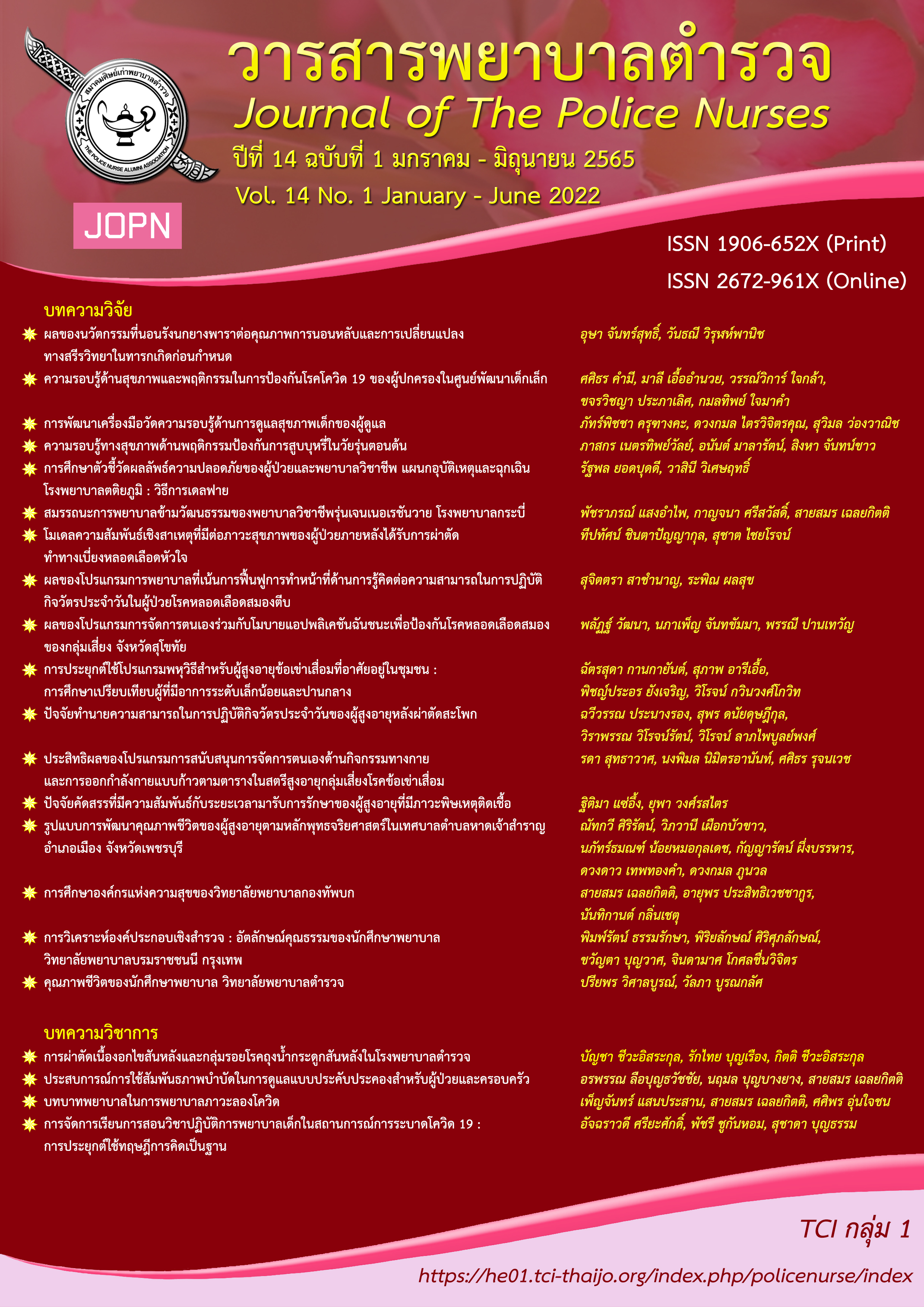THE EXPERIENCES OF USING THE THERAPEUTIC RELATIONSHIPS IN PALLIATIVE CARE FOR PATIENTS AND FAMILIES
Keywords:
therapeutic relationships, palliative care, patients and familiesAbstract
In this academic article, the authors complied from experience as mental health and psychiatric nurses using therapeutic relationship concepts of Peplau’s theories (1997) and empowerment concepts of Gibson’s model (1991) for palliative care. Lessons taken from group discussions were also used with physicians, professional nurses, priests, and clergies, as well as the postural teams of St. Louis Hospital. Then, the analysis was conducted to conclude the best care guideline at that time for the patients, their relatives, and their family. The main objectives of palliative care for end-of-life patients are to decrease their suffering from the symptoms, create relationships, accept, show sympathy, and understand the patients, their family, and their caregivers. Therefore, the patients and their families can receive the opportunity to let off their distress and stress leading to clarity in their knowledge and understanding that decreases their tension and anxiety. This circumstance can provide a calm, comfortable, and relaxed environment waiting for the last together moments of their lives. Moreover, this will allow the patients and their families to be able to manage their final wills giving importance to the faith and religious practices, in which every party should provide precedence to the patients so that they can face death with the best human dignity.
Downloads
References
Artsanthia, J., Noppornpun M., Mungsungnen, S., Teeradetchachart, P., & Amaridchatchawan, S. (2021). The perception of needs in end stage renal disease patients and caregivers for palliative care: Phenomenological study. Journal of The Royal Thai Army Nurses, 22(1), 244-253.
Connor, S. R., & Bermedo, M. C. (2014). Global atlas of palliative care at the end of life. 2014. World Health Organization and Worldwide Palliative Care Alliance.
Gibson, C. H. (1991). A concept analysis of empowerment. Journal of Advanced Nursing, 16(3), 354-361.
Lueboonthavatchai, O. (2011). Health counseling. Bangkok: The Chulalongkorn University Press.
Lueboonthavatchai, O., Kitimascool, V., & Chaleoykitti, S. (2018). Using the therapeutic relationship in palliative care. Journal of Nursing Division, 45(3), 159-170.
Nimmanwolwong, N. (2021). Caring for palliative patients and families. Bangkok: Cancer Centered, Phayathai hospital.
Peplau, H. E. (1997). Peplau's theory of interpersonal relations. Nursing science quarterly, 10(4), 162-167.
Sepúlveda, C., Marlin, A., Yoshida, T., & Ullrich, A. (2002). Palliative care: the World Health Organization's global perspective. Journal of pain and symptom management, 24(2), 91-96.
Siriratanapongtorn, N., Thungngoen, P., Mana, N., & Krutmuang, P. (2017). Perception of nurses about palliative care and end of life in Naresuan University Hospital, Phitsanulok. Journal of The Royal Thai Army Nurses, 18(suppl.2), 221-228.
Downloads
Published
How to Cite
Issue
Section
License
Copyright (c) 2022 JOURNAL OF THE POLICE NURSES

This work is licensed under a Creative Commons Attribution-NonCommercial-NoDerivatives 4.0 International License.
ผลงานที่ได้ตีพิมพ์แล้วจะเป็นลิขสิทธิ์ของวารสารพยาบาลตำรวจ















